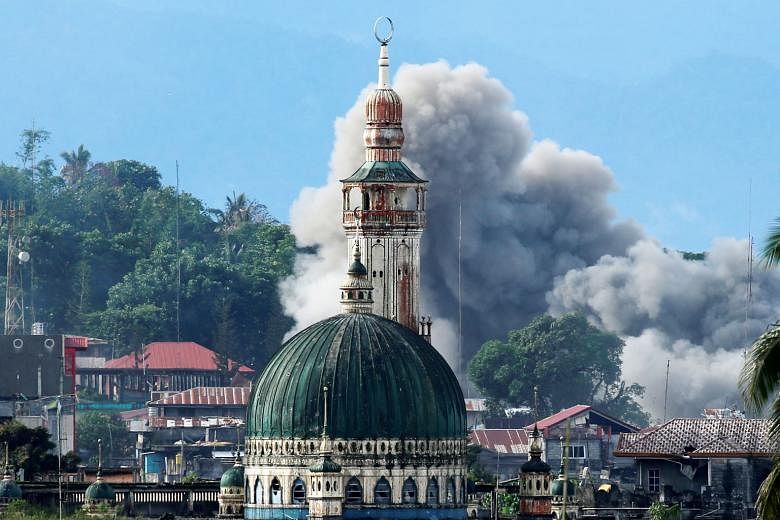Blame game in Marawi
Macabangkit B. Lanto
Philippine Daily Inquirer
"But Mommy, I thought it would not last longer than three days."
That was the response of my daughter Paramanis-Api to the constant berating of my wife for leaving behind precious possessions like her jewellery box when they evacuated to Iligan on the night of May 23, when the siege of Marawi began.
I recall this because similar words were used by Defence Secretary Delfin Lorenzana, when he was asked about his thoughts upon learning of the attack on Marawi.
As it turned out, our house was ransacked and bombed; it is now in ruins.
Truth be told, the rumour mill in Marawi had been fuelled for months by the then impending attack; it went into an overdrive for weeks after the humiliating defeat of the Maute-Hapilon jihadists in the nearby town of Piagapo.
The residents talked about it, first in whispers in the coffee shops of Iligan and Cagayan de Oro, before escalating it into open discussion, even in sermons during Salatul Juma'ah, or Friday congregations.
But nobody took the rumours seriously.
Once, my sister Rocaya frantically called me to ask about the jihadists' open recruitment of young Maranaw people. But I told her to stop fussing over it - a remark reflective of the zeitgeist then.
Who would think that a ragtag band of dissidents from the rural town of Butig with less than 100 members could even think of attacking Marawi, the nerve centre of the cultural, social, financial and political life of the Maranaw?

Everyone thought that the publicised designation of Isnilon Hapilon as emir and his presence in Marawi were mere hot air to bolster the morale of the jihadists and inspire their recruitment campaign.
We thought: No way could they match the firepower and capability of our security forces.
Alas, we were wrong!
And who is to blame for the debacle?
The Philippines President put the blame on the Maranaw for allowing the jihadists to enter Marawi. That's misplaced defence logic for government incompetence. The raison d'etre of the government is primarily to protect its citizens.
The present impasse has proven beyond doubt the jihadists' military capability to withstand government might.
The ulama blame the Maranaw's deviation from the teachings of Islam. That's self-flagellation. I daresay that among the Muslim tribes, the Maranaw have shown more devotion to Islam.
Critics of the administration as well as armchair analysts accuse government security forces of failure of intelligence.
Wrong. They have been warning residents of the terrorists' design.
But then what preventive measure did the military take?
Residents were wrong and are now paying a very high price for their naivete.
Lesson learnt: Never underestimate your enemy, especially one "who looks into the barrel of your gun and sees paradise".
ISIS will still lure the marginalised
Smith Alhaciar
The Jakarta Post
Finally, after fierce fighting for more than eight months, Iraqi Prime Minister Heidar al-Abadi on July 9 declared the great victory of Iraqi forces over the Islamic State in Iraq and Syria (ISIS) in Mosul.
Mosul, the country's second- biggest city after Baghdad, was the de facto capital of the terrorist group in Iraq.
Meanwhile, the so-called Syrian Democratic Forces (SDF) expelled ISIS from Manbij and Tabqa. The SDF is currently encircling Raqqa, the de facto capital of ISIS in Syria.
Considering its limited armament and personnel, and the huge enemy forces, like Iraq's Shi'ite militia (Hashid Shaabi), Iraq's Kurdish militia (Peshmerga), Iraq's Sunni militia, as well as Turkish, Syrian, Iranian and SDF forces - assisted by United States-led coalition airstrikes - ISIS cannot avoid defeat.
However, the fate of the terrorist group in Iraq and Syria will not be sealed very soon. From Iraq and Syria, it is capable of recruiting and driving its supporters to carry out terror attacks all over the world. The group's leader, Abu Bakr al-Baghdadi, who has reportedly been killed, had several months ago pushed his supporters throughout the world to develop autonomous forces in their respective counties to anticipate ISIS' destruction in Iraq and Syria.
For the South-east Asian region, he designated Mindanao in the southern Philippines as ISIS' base. In the beginning of the clash between the Philippine armed forces and the Maute-Abu Sayyaf group, seven Indonesians of the Maute group, who have since been killed in the conflict, sneaked into Mindanao between November 2016 and April 2017.
The war for Mosul started in October last year, while Al-Bab, Jarabulus and Tabqa fell between September last year and May this year. Raqqa's siege began after that.
This means that the entry of about 40 Indonesians into Mindanao was a consequence of the decline of ISIS in Iraq and Syria.
Mindanao was chosen because this region has become a stronghold of radical Muslims who resist Manila's control. The Philippine demographic policy, poverty and other social issues have also contributed to the rebellion.
Manila must mobilise all forces at its disposal to conquer ISIS-related groups unequivocally. Otherwise, it will be very difficult to tame them in future. Coordinated maritime patrols involving Indonesia, the Philippines and Malaysia are an appropriate measure.
It seems that the patrols focus more on efforts to prevent a spillover of the Marawi war to Indonesia and Malaysia. But it is also important to prevent the stream of Indonesian extremists into the Philippines. The fall of Mosul and the psychological victory gained by the Maute and Abu Sayyaf groups in the Philippines will change the course of the flow of South-east Asian terrorists, especially Indonesian ISIS supporters, from Iraq and Syria to Mindanao. The decline of ISIS in Iraq and Syria, as well as the Marawi war, poses a security threat to South-east Asia.
ISIS may fade out in Iraq and Syria physically, but its ideology will remain alive and continue to lure those who are marginalised economically, deprived politically and retarded culturally.

